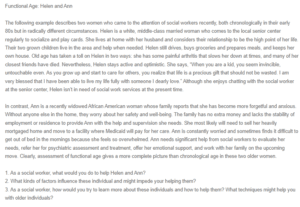Functional Age Case Study
As a social worker, what would you do to help Helen and Ann?
As a social worker, I would first analyze Helen and Ann’s specific needs and circumstances, considering their functional age as well as their chronological age. I would focus on providing emotional support and assisting Helen, who is active and self-sufficient but dealing with arthritis and the loss of friends, in accessing resources for controlling her arthritis and coping with social isolation. In Ann’s case, I would prioritize a thorough assessment of her cognitive and emotional well-being, referring her for psychiatric assessment and treatment, and collaborating with her family to plan and facilitate a safe and supportive transition to a care facility where Medicaid can cover her needs. Additionally, I would explore any available community resources or programs that could assist Ann and her family in this challenging situation. Hire our assignment writing services in case your assignment is devastating you.
What kinds of factors influence these individual and might impede your helping them?
Several factors can influence an individual’s requirements and potentially hamper social worker aid. Their socioeconomic situation, familial support, cultural background, and access to healthcare services are among these influences. Helen’s strong family support, middle-class status, and access to healthcare resources enable her freedom. In contrast, Ann’s poor financial means, the recent loss of her marriage, and probable racial gaps in healthcare access may obstruct the aid she requires. Furthermore, geographical location and the availability of appropriate care facilities can have a considerable impact on the quality and availability of services for both individuals.
As a social worker, how would you try to learn more about these individuals and how to help them? What techniques might help you with older individuals?
I would use several strategies targeted at older adults to learn more about Helen and Ann and effectively help them. First, I would do a thorough examination of each individual, including their physical and mental health, social support network, living situations, and cultural background. Structured interviews, observation, and a review of their medical and psychosocial histories could all be part of this. Further, active listening and empathy would be essential in developing trust and rapport, as older people typically value being heard and affirmed (Jameson, 2023). In addition, I would work with other experts, such as healthcare providers and family members, to learn about their requirements and preferences. Finally, I would use age-appropriate communication methods, respecting their autonomy and preferences, to ensure that they actively participate in the decision-making process and feel in control of their care.
References
Jameson, J. K. (2023). Communication for Constructive Workplace Conflict. John Wiley & Sons.
ORDER A PLAGIARISM-FREE PAPER HERE
We’ll write everything from scratch
Question

Functional Age Case Study
Functional Age: Helen and Ann
The following example describes two women who came to the attention of social workers recently, both chronologically in their early 80s but in radically different circumstances. Helen is a white, middle-class married woman who comes to the local senior center regularly to socialize and play cards. She lives at home with her husband and considers their relationship to be the high point of her life. Their two grown children live in the area and help when needed. Helen still drives, buys groceries and prepares meals, and keeps her own house. Old age has taken a toll on Helen in two ways: she has some painful arthritis that slows her down at times, and many of her closest friends have died. Nevertheless, Helen stays active and optimistic. She says, “When you are a kid, you seem invincible, untouchable even. As you grow up and start to care for others, you realize that life is a precious gift that should not be wasted. I am very blessed that I have been able to live my life fully with someone I dearly love.” Although she enjoys chatting with the social worker at the senior center, Helen isn’t in need of social work services at the present time.
In contrast, Ann is a recently widowed African American woman whose family reports that she has become more forgetful and anxious. Without anyone else in the home, they worry about her safety and well-being. The family has no extra money and lacks the stability of employment or residence to provide Ann with the help and supervision she needs. She most likely will need to sell her heavily mortgaged home and move to a facility where Medicaid will pay for her care. Ann is constantly worried and sometimes finds it difficult to get out of bed in the mornings because she feels so overwhelmed. Ann needs significant help from social workers to evaluate her needs, refer her for psychiatric assessment and treatment, offer her emotional support, and work with her family on the upcoming move. Clearly, assessment of functional age gives a more complete picture than chronological age in these two older women.
1. As a social worker, what would you do to help Helen and Ann?
2. What kinds of factors influence these individual and might impede your helping them?
3. As a social worker, how would you try to learn more about these individuals and how to help them? What techniques might help you with older individuals?

